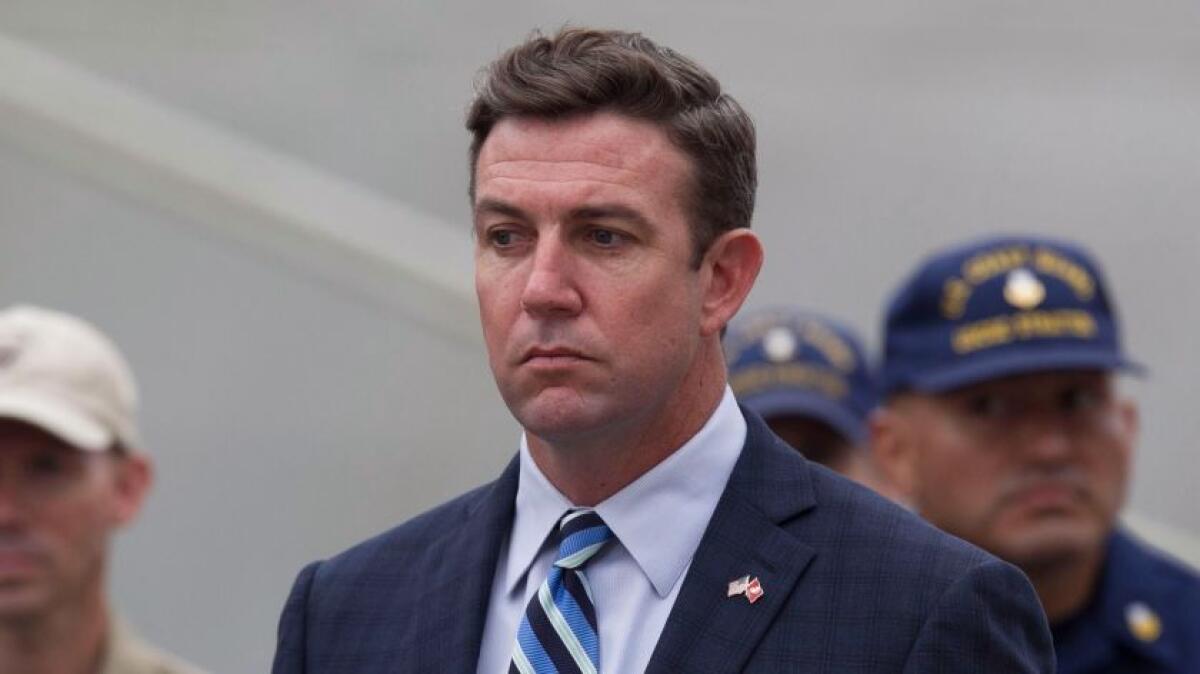Former Rep. Duncan Hunter gets 11 months in prison for campaign finance violations

Former Rep. Duncan Hunter was sentenced to 11 months in prison for illegally using campaign donations for personal purposes.
- Share via
Former U.S. Rep. Duncan Hunter was sentenced to 11 months in federal prison Monday for conspiring to illegally use more than $150,000 of his campaign money for personal benefit.
U.S. District Court Judge Thomas J. Whelan handed down the sentence at a hearing for the former Republican lawmaker from Alpine. Hunter pleaded guilty in December to a felony conspiracy charge, one of 60 counts in an August 2018 indictment that also named his wife and former campaign manager, Margaret.
Both Duncan, 43, and Margaret Hunter, 44, pleaded not guilty when they were arraigned, then changed their pleas last year in separate agreements with prosecutors.
Whelan ordered Hunter to surrender by May 29 to begin serving his sentence.
The disgraced former lawmaker resigned his seat representing the state’s 50th District in January during his sixth term. He had succeeded his father, former Rep. Duncan Lee Hunter, who served 14 terms in Congress, in the seat.
Margaret Hunter is scheduled to be sentenced April 7.
According to the indictment, the Hunters relied for years on campaign contributions to pay routine family expenses such as dental visits, home repairs and fast-food meals. They also used the donations to pay for exotic vacations, private-school tuition, video games and plane tickets for Margaret’s mother to travel to and from Poland.
The Hunters used more than $500 in campaign funds to fly the family’s pet rabbit across the country with them, Margaret Hunter admitted in her plea agreement.
ln total, the initial indictment accused the Hunters of misusing $250,000 in campaign funds.
In later court filings, it became clear that prosecutors believed Hunter had extramarital affairs with at least five women and spent campaign funds on such things as travel, drinks and hotels.
Though never identified publicly, three of the women were noted to be lobbyists and two others were reported to be congressional staffers.
Hunter was accused of using campaign funds to pay for a three-day weekend at Lake Tahoe with a woman who was not his wife. On another occasion, he used political donations to pay for a stay at the Liaison Capitol Hill hotel in Washington, D.C., records show.
The indictment also said that Hunter and his wife were aware that their use of campaign donations was questionable. Prosecutors said Hunter was warned about the spending as early as 2010.
The couple’s joint bank account was overdrawn more than 1,100 times over the six-plus years of records examined by prosecutors, and the couple racked up some $36,000 in overdraft penalties — fees they paid using campaign funds, the indictment stated.
Text messages included in court files show that at one point Margaret advised her husband to use the campaign credit card to buy a pair of Hawaiian shorts he wanted but could not afford — and to tell his then-treasurer that the purchase was in order to assist “wounded warriors.”
The criminal charges filed in 2018 came after the Federal Election Commission and the San Diego Union-Tribune questioned campaign expenditures Hunter reported in April 2016 — a series of video-game purchases and a payment to his children’s private school.
Hunter initially blamed his son for grabbing the wrong credit card to pay the video-game charges, explaining that both of the cards were blue.
Later, the congressman appeared to blame his wife for improper charges, pointing out that she was in charge of the family finances and she was receiving $3,000 a month to serve as his campaign treasurer.
The Union-Tribune continued to raise questions about Hunter’s campaign spending over the months that followed. By the 2016 general election, Hunter had repaid about $60,000 to his campaign for expenditures he said were mistaken or insufficiently documented.
Neither the denials nor the repayment quelled the investigation. The lawmaker dismissed follow-up stories by the Union-Tribune as “fake news” and said the newspaper was out to get him.
Federal prosecutors opened their criminal case in mid-2016, a probe that Hunter dismissed as being conducted by “deep state” partisans within the FBI and others in the U.S. government.
The investigation, and the cost of his legal defense, took its toll on Hunter and his family.
The congressman and his wife sold their Alpine home in 2017 to pay off family debts and moved into the nearby home of Hunter’s father.
All the while, the Marine Corps veteran who served multiple tours of duty in Iraq and Afghanistan before he succeeded his father in Congress in 2009 remained adamant than he did nothing wrong.
His lawyers argued in court as recently as this summer that the campaign spending, including resort stays and meals with girlfriends, legally constituted legislative acts — meaning they could not be prosecuted as crimes under the speech or debate clause of the U.S. Constitution.
Despite the scandal, Hunter won reelection in 2016 and again in 2018.
But with an indictment looming, Hunter drew formidable challengers this election cycle. After he pleaded guilty in December, Hunter’s name did not appear on the ballot for the March 3 primary.
Cook and Moran write for the San Diego Union-Tribune.
Union-Tribune staff writer Jeff McDonald contributed to this report.
More to Read
Updates
1:16 p.m. March 17, 2020: This story has been updated with additional information from the court.
Sign up for Essential California
The most important California stories and recommendations in your inbox every morning.
You may occasionally receive promotional content from the Los Angeles Times.












